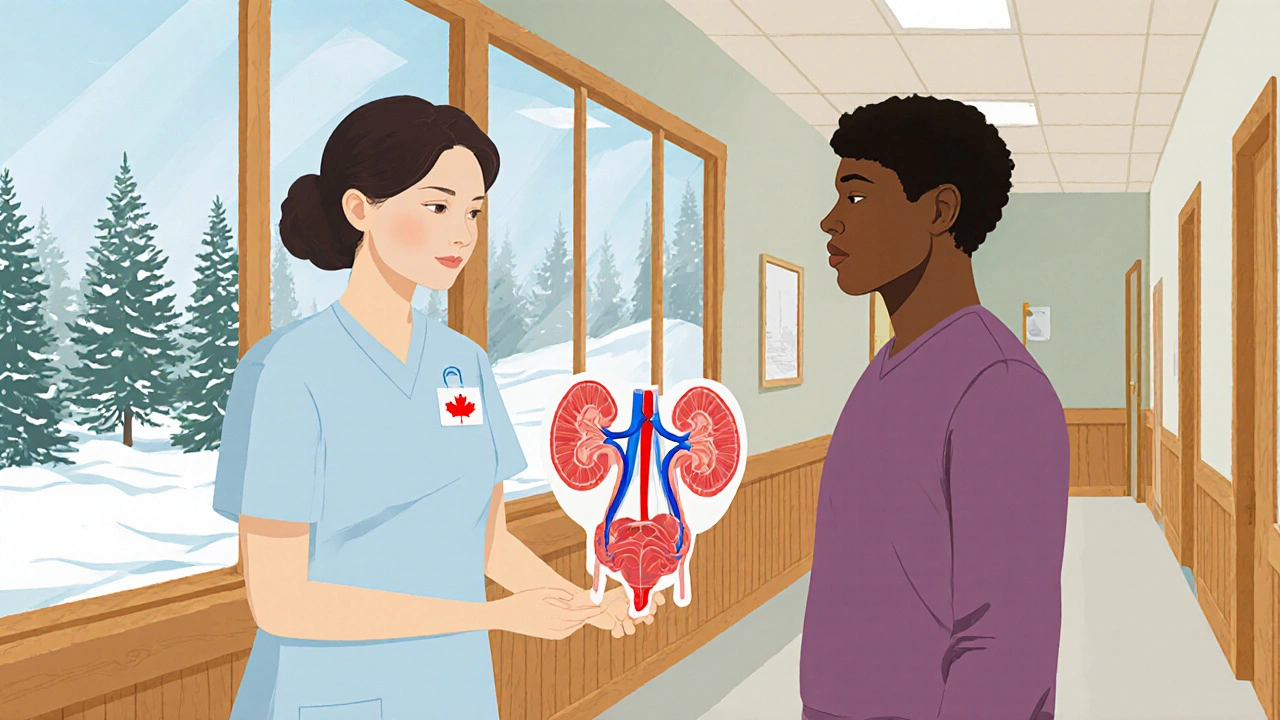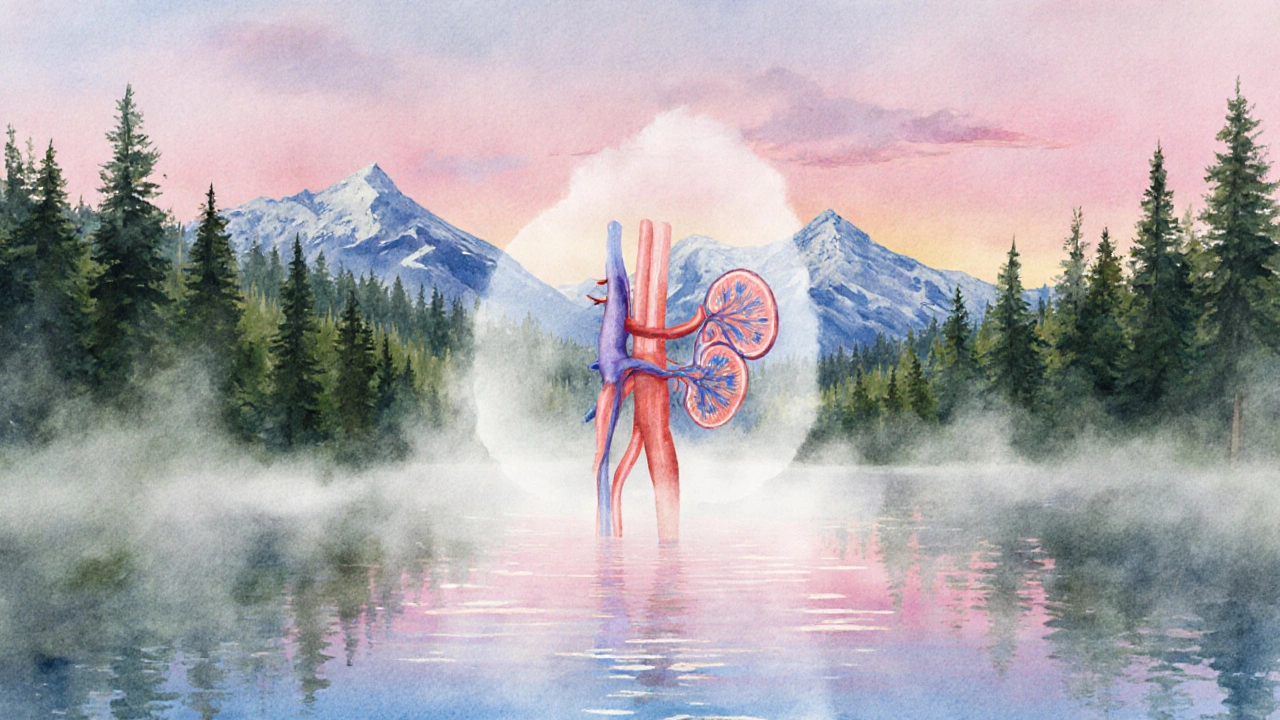When your bladder won’t empty properly, you might think the problem stops there. In reality, persistent urinary retention can send shockwaves through the entire urinary system, ending with serious kidney consequences. This article unpacks the science, clues you need to watch for, and practical steps to protect your kidneys.
Quick Takeaways
- Urinary retention strains the kidneys by causing back‑pressure and infections.
- Acute retention is an emergency; chronic retention silently harms renal function over months.
- Common culprits include prostate enlargement, neurogenic bladder, and certain medications.
- Early symptoms are a weak stream, frequent urge, and lower‑back discomfort.
- Prompt treatment-catheterization, lifestyle tweaks, or surgery-can halt kidney damage.
What Is Urinary Retention?
Urinary retention is the inability to completely empty the bladder despite the desire to urinate. It appears in two forms: acute, which develops suddenly and demands immediate care, and chronic, which builds up slowly and may go unnoticed for years.
Kidney Health Basics
Kidney is a bean‑shaped organ that filters waste, balances electrolytes, and regulates blood pressure. Each kidney contains about a million filtering units called nephrons, which rely on steady urine flow to keep waste moving out of the body. When that flow is blocked, pressure builds up and the nephrons can suffer.
How Retention Sends Pressure Back to the Kidneys
The urinary system works like a plumbing network: the bladder stores urine, the ureters carry it from the kidneys, and the urethra releases it. If the bladder can’t empty, urine backs up into the ureters, a condition known as hydronephrosis is swelling of a kidney due to urine buildup. This back‑pressure reduces the glomerular filtration rate, the metric doctors use to gauge kidney performance.
Over time, chronic back‑pressure leads to scarring of renal tissue, a decline in renal function is the kidneys' ability to filter blood and excrete waste. The damage is often irreversible, making early detection crucial.

Common Causes Linking the Bladder and Kidneys
| Cause | How It Traps Urine | Potential Kidney Effect |
|---|---|---|
| Prostate enlargement is benign growth of the male prostate gland that narrows the urethra | Urethral compression slows outflow | Increased back‑pressure → hydronephrosis |
| Neurogenic bladder is loss of nerve control over bladder muscles | Muscle fails to contract fully | Chronic residual urine → infection, renal scarring |
| Medications (anticholinergics, opioids) | Relax bladder muscles, reduce sensation | Retention episodes → recurrent UTIs, kidney stress |
| Pelvic organ prolapse (women) | Anatomical shift blocks urethra | Urine stasis → hydronephrosis |
| Obstruction from stones or tumors | Physical blockage in ureter or bladder neck | Sudden pressure spikes → acute kidney injury |
Warning Signs You Should Not Ignore
Both acute and chronic retention share a few red‑flag symptoms. If you notice any of these, it’s time to act:
- Weak or intermittent urine stream
- Feeling of incomplete emptying after voiding
- Frequent urge to urinate, especially at night
- Lower‑back or flank pain-often a sign of hydronephrosis
- Fever, chills, or cloudy urine indicating infection
In men over 50, a gradual decline in stream strength is frequently linked to prostate enlargement. In younger adults, neurological conditions such as spinal cord injury can cause neurogenic bladder. Recognizing these patterns helps you get the right specialist-urologist or neurologist-so kidney damage can be averted.
Prevention and Management Strategies
Keeping your kidneys safe starts with relieving bladder pressure. Here are evidence‑based steps:
- Hydration: Aim for 1.5-2L of fluid a day unless fluid restriction is medically indicated. Adequate water dilutes urine and promotes regular bladder emptying.
- Timed voiding: Schedule bathroom trips every 3-4hours, even if the urge is low. This reduces residual volume.
- Pelvic floor exercises: Strengthening the muscles around the urethra improves contractile force, especially useful for women with prolapse.
- Medication review: Ask your doctor if any prescriptions (e.g., antihistamines, antidepressants) might be worsening retention.
- Catheter use when needed: Urinary catheter is a tube inserted into the bladder to drain urine can be lifesaving in acute episodes but should be limited to avoid infection.
- Surgical options: For severe prostate enlargement, transurethral resection (TURP) or laser therapies restore flow. For neurogenic issues, bladder augmentation or sacral nerve stimulation may be recommended.
Regular monitoring of kidney function-via blood creatinine and urine analysis-helps catch early impairment before irreversible damage sets in.
When to Seek Professional Help
If any of the following occur, treat them as emergencies:
- Sudden inability to urinate (complete acute retention)
- Severe flank pain that radiates to the groin
- Fever over 38°C with urinary symptoms
- Progressively worsening kidney test results
Emergency departments can quickly insert a temporary catheter to relieve pressure. Follow‑up with a urologist within 24-48hours to identify the underlying cause and plan long‑term management.

Frequently Asked Questions
Can occasional urinary retention damage the kidneys?
A single brief episode usually won’t harm the kidneys, but repeated episodes increase the risk of infection and back‑pressure that can gradually impair renal function.
What’s the difference between acute and chronic urinary retention?
Acute retention happens suddenly, often due to a blockage or medication side‑effect, and requires immediate drainage. Chronic retention builds up over weeks or months, may cause a partially full bladder, and is more likely to lead to silent kidney damage.
Is hydronephrosis always caused by urinary retention?
No. While back‑pressure from retention is a common cause, hydronephrosis can also result from kidney stones, congenital abnormalities, or tumors obstructing the ureters.
Can lifestyle changes alone reverse kidney damage caused by retention?
If kidney damage is caught early and the underlying retention is corrected, kidney function may stabilize or improve. Advanced scarring, however, often requires medical intervention and may be permanent.
Should I get regular kidney tests if I have chronic urinary retention?
Yes. Baseline blood creatinine, estimated glomerular filtration rate (eGFR), and periodic urine protein tests help track renal health and signal when treatment adjustments are needed.


14 Responses
Urinary retention is more than an uncomfortable nuisance; it is a silent threat to kidney health that can develop over months if left unchecked. When the bladder fails to empty fully, residual urine creates a reservoir of pressure that travels backward through the ureters. This back‑pressure, medically known as hydronephrosis, forces the kidneys to work against a higher resistance, lowering the glomerular filtration rate. Over time, the nephrons-tiny filtering units-experience shear stress and may begin to scar, which is an irreversible process in most cases. Chronic retention also predisposes the urinary tract to infections because stagnant urine serves as a breeding ground for bacteria. Recurrent infections can spread upward, causing pyelonephritis, which further compromises renal tissue. Moreover, the constant strain can trigger hormonal imbalances that affect blood pressure regulation, adding another layer of risk to cardiovascular health. Patients with prostate enlargement often report a weak or intermittent stream, but the underlying danger is the gradual buildup of residual volume that the bladder cannot expel. Neurogenic bladder, common after spinal cord injuries, presents a similar challenge, where the nerves fail to signal a complete void, resulting in chronic overdistension. Medications such as anticholinergics and opioids may exacerbate the problem by reducing bladder contractility, so a medication review is essential for anyone experiencing symptoms. Lifestyle adjustments, like adequate hydration and timed voiding, can mitigate some of the pressure, but they are not substitutes for proper medical intervention when obstruction is present. Catheterization, while useful in acute emergencies, should be limited to short‑term use because of the infection risk associated with indwelling devices. Surgical options, ranging from TURP for prostate obstruction to sacral nerve stimulation for neurogenic causes, aim to restore normal flow and relieve kidney stress. Regular monitoring of kidney function-through serum creatinine, eGFR, and urine protein tests-helps catch early declines before they become permanent. Early detection and prompt treatment are the cornerstones of preserving renal health in the context of urinary retention.
Thank you for presenting such a thorough overview of the relationship between urinary retention and renal impairment. The clarity with which you delineated acute versus chronic scenarios will undoubtedly assist many readers in recognizing when to seek urgent care.
In many parts of India we still see patients presenting late because the link between bladder issues and kidney health isn’t widely taught. Community health programs that explain the back‑pressure concept can really change outcomes.
It is interesting to reflect on how the body’s plumbing mirrors philosophical ideas of balance and flow. When one part gets blocked, the whole system feels the strain, reminding us of the need for holistic care.
Totally overhyped, u know? This retention thing is just a excuse for doc bills. #NotBuyingIt
Wow, great read! 😂👍
Super helpful! I’ll start scheduling timed voids tomorrow.
What a powerful reminder that our bodies demand attention! When you feel that lingering pressure, think of it as a backstage whisper urging you to act before the curtain falls on kidney health.
While the article presents a solid foundation, it overlooks the nuanced pharmacological interactions that may exacerbate chronic retention. A more exhaustive review of drug‑induced mechanisms would benefit the discerning reader.
Look, folks-if you ignore the warning signs, your kidneys will scream louder than a teenager at a rock concert!!! Seriously, get checked before it becomes a drama you can’t edit.
From a nephrology perspective, the hemodynamic alterations described align with current pathophysiological models, emphasizing the importance of early biomarker surveillance.
Honestly this topic is just basic 101. Anyone with a med textbook could sum it up faster. lol
Great points, especially about lifestyle tweaks. I’d add that regular pelvic floor workouts can boost bladder emptying efficiency.
Thanks for the deep dive! It’s reassuring to know that early action can keep our kidneys happy.